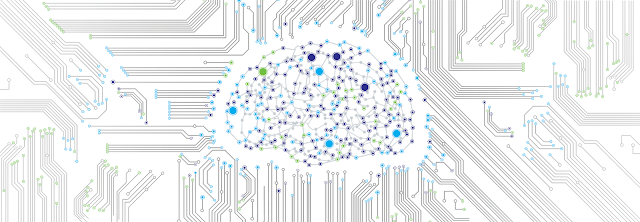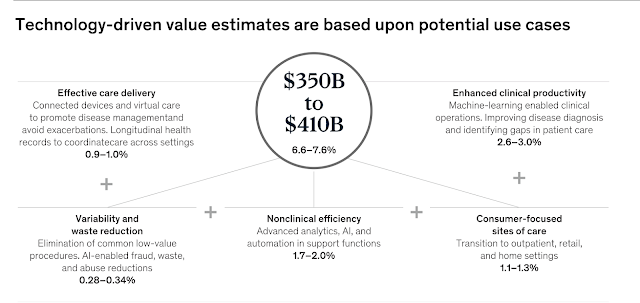Machine Learning Helping Discover COVID-19 Treatment
Companies started to utilize AI in hopes of finding a treatment for the current outbreak of COVID-19. A London-based company BenevolentAI and US company Google are among the companies that are using AI in hopes of finding a treatment for the virus (source). Both companies rely on machine learning patterns based on the existing and new data that is being feed to the AI.
Knowledge Graph Example (source)
BenevolentAI
was focused on chronic disease before the outbreak but was able to train it’s
AI to work on COVID-19. They were able to do this due to volume of data that we
are getting from around the world regarding the virus. The company’s AI, using knowledge
graph, can look through large amount of data on existing viruses and
compare the elements of those viruses and how they function with COVID-19. The researchers
hope to find commonality among the viruses that would help them determent the treatment
for COVID-19 using existing medications. Their resource allowed them to look at
other types of coronaviruses, including SARS. The AI was able to find a dug called
Baricitinib that could potentially slow down the ability of virus to infect lung
cells. The drug is currently licensed to treat rheumatoid arthritis.
COVID-19 (source)
Google
is using its data on genomes to predict the organism’s protein structure. They
are hopping that their DeepMind AI would help finding possible drug that would
work against COVID-19. The DeepMind has
a learning library which uses neural networks to predict the curve or crinkle
of proteins that make up the organism based on their genome. Once they know the receptors of the virus,
they are hoping to use the information to find the drug that would disrupt its
ability to bind to human cells or slow the rate it reproduces. Google has not
yet tested the predictions of the AI in real life but are hopping that researches
can use them to develop treatments for COVID-19.
Supervised Learning VS
Unsupervised Learning (source)
The
examples of the two companies that are working to develop a treatment using
machine learning is fascinating to me. There many other examples of machine learning
that I know of, but it was my first-time encountering use of AI in developing
medications. Usually, you think of machine learning in more broader cases like
self-driving cars. The cars have multiple different input variables that help
it to learn. In the example of the car there both elements of supervised and unsupervised
learning that happens. We feed the car with the initial data and it’s able to
learn new things as it drives around. In the case of developing new drugs, in
my opinion, the AI is not there yet. Currently AI is capable of supervised
learning that would work majority of the time in finding current drugs to use
against the viruses but not creating new drugs. It’s hard to see AI having capability
of doing unsupervised learning to develop completely new drug. The reason I
think that is because AI doesn’t have a capability of doing clinical trials.
Also, it’s hard to see doctors that would use AI created drug combinations to
do clinical trials.





It will be interesting to see how these things translate into real life clinical trials. Like you said, I had never thought of AI being used to develop medication. AI seems to be applicable to so many more fields than I had thought and I'm sure that in the near future we will see AI become more and more common in a wider variety of fields as AI becomes more advanced.
ReplyDeleteI agree with you never taught that it could have been possible.
DeleteInstead of trying to replace doctors with AI, I think it'd be more realistic/easier to develop an AI to assist doctors in finding drug combinations. An optimal AI will be able to find these patterns faster than a human ever could, and it could save lives considering it's being used in the medical field. I admit, I don't know much about the process of choosing medication to prescribe to patients, but I'd imagine an AI would be able to streamline the process.
ReplyDeleteI don't think it will happen that AI will replace the doctors. As a society we are not ready to trust AI that much. Like you said I think it will be more realistic to use it as an assistance to doctors and not replacement.
DeleteI feel like the future of just about every industry/profession will be having experts in their respective fields and AI programmers working alongside one another to build models. It will be interesting to see how quickly AI bleeds over into other fields that we'd never associate it with.
ReplyDeleteIt seems that for now, these technologies are reliant on algorithms that solve issues pertaining to finding counters to viruses or infections. Do you think eventually that they will move to simulation type models to find ways to cure or prevent some of these diseases in the future?
ReplyDeleteWe growing data bases and the use of AI in the current pandemic, I think it's likely that it will happen. Many might not have realized the power of AI in medical filed so I think more time and resources will be put towards it going forward.
DeleteAI appears to be very helpful in finding a cure for COVID-19, since there isn't one discovered yet. Currently, doctors only cure symptoms and let patients heal naturally, which makes it so deadly on the elderly. I hope once a cure is found, some AI will be honored.
ReplyDelete